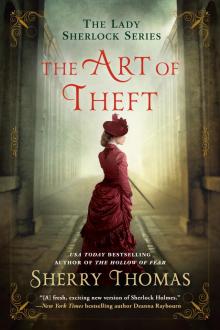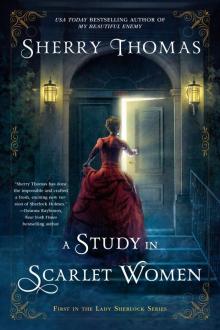- Home
- Sherry Thomas
The Art of Theft Page 10
The Art of Theft Read online
Page 10
While they lunched on pot-au-feu, Charlotte spreading only a fraction of her customary amount of butter on a slice of rustic bread, Mr. Marbleton, in very decent French, asked for directions to the château from a local farmer. He also asked whether the château admitted visitors, as most stately manors in Britain, which they had just visited, surely did.
The farmer shook his head. “Pas celui-ci.”
Not this one.
They finished their meal and strolled in the direction of the château. The sky had cleared, the sun shone, and though it remained chilly, Livia’s heart lifted at the sight of the pale blue sky.
The buildings of the village, largely clustered around the square, quickly thinned. Cobblestoned streets gave away to dirt lanes cutting between fallow fields and stubbly pastures where goats and donkeys foraged.
The ground dipped and rose, both gently. To Livia’s surprise, from atop the next rise, she saw their quarry.
When the article had mentioned extensive grounds, she had envisioned something on the scale of Stern Hollow. But one glance was enough to take in the entirety of the estate.
Granted, the avenue that ran straight from the gate to the bridge was impressive. The formal gardens, even from a distance, was geometric grandeur. And the château itself, slate-roofed, clear-windowed, almost golden in the slanting sun of the afternoon, was indubitably beautiful. But there was hardly any extra acreage, parkland or farmland. The whole thing made Livia think of a massive wedding cake perched on a too-small table, leaving barely enough room for a cake knife.
A ten-foot-high wrought iron fence surrounded the entire estate. They walked alongside it, stopping from time to time to admire the view inside. Mr. Marbleton carried a rucksack. Livia had assumed it contained a water canteen and some extra food. But the first time they stopped, he took out from the rucksack a book that wasn’t big but rather thick—and held it so that it pointed toward the château.
“Is that a detective camera?” asked Charlotte. “Custom-made?”
“Frances and I made it with parts from other cameras,” he answered happily. “And we did some additional bits of tinkering so we could use sensitized paper rather than plates.”
Livia remembered that he and his sister had passed themselves off as a photographer and his assistant during the summer.
Mr. Marbleton took a number of other images as they circumnavigated the estate. There was indeed an orchard, if two dozen apple trees could be called an orchard. At the back of the estate, there was in truth a herd of dairy cows, too, comprised of all of three heads. Occasionally dogs barked; Charlotte listened carefully, as if trying to deduce their numbers.
“I don’t think we’ll be able to learn much more than we have, promenading on the periphery,” said Charlotte once they’d done an entire circuit. “It’s getting a bit late. We should head back.”
They had almost reached the village when Mr. Marbleton said, “You ladies have a safe trip back to Paris. I’ll stay here tonight.”
It made sense, his plan; they should know what the place would be like at night. But still Livia’s heartbeat stalled. “Will it be safe?”
“For an observer, I don’t see why not.”
“What if there are guard dogs?” Charlotte wouldn’t have paid attention to the barking otherwise.
“What if there are? I don’t see how that should endanger me sitting in the café, listening to gossip.”
She looked at him incredulously. “Is that really all you are going to do?”
He winced. And then groaned. “I would have preferred to lie to you, Miss Olivia, but alas, all the inculcation from my parents is preventing me from withholding the truth. No, that is not all I am going to do, if you must know. I also mean to take myself back to the château, climb the fence, and get as close to the manor itself as possible.”
Livia bit her lower lip. “Then I’ll also stay here tonight. I won’t tag along when you venture out, since I’ll most likely get stuck on the fence and spoil your entire plan. But I’d rather be worrying here than worrying in Paris.”
“Then I suppose I should remain here as chaperone,” said Mrs. Watson.
Charlotte glanced at the three who had declared their intentions. “I will go back to Paris. I haven’t read everything that has been furnished to us in that dossier.”
Ah, Lord Ingram was due this evening. And Charlotte wouldn’t wish to miss his arrival.
* * *
Charlotte read everything in the dossier twice, except the article on the masquerade ball. That one she read three times. By the time she finished, she could recite, word for word, the final paragraph extolling the fireworks display that marked the end of the night. Then she bathed, dressed for dinner, and studied the architectural plans until the dinner bell rang.
In the dining room, she was the only person at table. Forêt, after ladling out a bowl of thick potage, stood back against the wall and seemed to disappear into it. He was unobtrusive, this man, effortless at making himself unnoticed—an interesting talent, given that he happened to be very good-looking.
“It’s just the two of us,” she said in English. “Why don’t you take a seat, sir?”
“I beg your pardon, Miss?”
She looked at him. “My father is a man of little significance. But his cousin, Mrs. Newell, is very well connected. She is related, by marriage and somewhat strenuously, to the Ashburtons of Derbyshire, the current Duke of Wycliffe among them.”
At the mention of the Ashburtons, something flickered in Forêt’s dark green eyes.
“Some years ago,” continued Charlotte, “when she still moved in Society, Mrs. Newell brought my sister and me to Eastleigh Park, the Duke of Wycliffe’s country seat, for a house party. When I was there I saw a photograph that caught my attention: The people in the picture were draped in garlands of tropical flowers, on an island with a dramatic landscape.
“I asked and was told that the lady in the picture was born an Ashburton, a cousin of the late duke. And those in the photograph with her were her husband and her two sons from a previous marriage. I may not remember every face in every photograph I have ever seen, but yours was a memorable face in a memorable photograph, sir.”
“Ah,” said Forêt, this time in perfect English, “Ash did warn me that my disguises would be too paltry for your penetrative gaze.”
“The lady’s late husband was an Atwood of Sussex. That would make you Mr. Atwood.”
“Lieutenant Atwood.”
“Pleased to make your acquaintance, Lieutenant.” She gestured at the chair at the opposite end of the table. “Won’t you join me for dinner?”
Lieutenant Atwood did not hesitate this time. He set a place, served himself a bowl of soup, and sat down.
“Lord Ingram mentioned that you were passing through France. Were you on your way back to India?”
“That is correct.”
“Did you come to England with Lord Remington?”
This time Lieutenant Atwood’s answer was slightly slower in coming. “Yes.”
Lord Remington, youngest of Lord Ingram’s three elder brothers, was attached to the viceroy’s office in Calcutta in an officially vague capacity. Charlotte would call him a spymaster, except she wasn’t sure that was all he did.
“I investigated a case for Lord Ingram at Stern Hollow. At the time, he mentioned that he’d entrusted his children to Lord Remington. But it became apparent later that the children had not been, in fact, with Lord Remington himself. Were they by some chance with you?”
Lieutenant Atwood inclined his head—this line of inquiry apparently did not bother him. “The children and their governess were at my place in Sussex. I was happy to host them, as I myself was needed at the estate, to make decisions and see to its upkeep.”
It was rare for a firstborn heir to join the military, which was more typically the lot of younger
sons.
“It sounds as if you hadn’t been home for some time.”
“Years.”
“May I venture to guess that you have been saving your home leaves for more travel, such as to Chinese Turkestan?”
Her dinner companion was reaching for a slice of baguette. His hand hovered for a moment above the basket. His eyes cast briefly downward, before he met Charlotte’s gaze. “Chinese Turkestan is a politically sensitive area,” he said evenly. “The Chinese would be quite miffed if the English were mucking about. The Russians wouldn’t be pleased either.”
“Which is why the English would be mucking about, I take it.”
“Just because the magazine I put in the dossier has an article on Chinese Turkestan doesn’t mean I have visited or plan to visit the area.”
Even though those pages had been read repeatedly and the rest of the magazine hardly riffled through?
“Of course you’re right about your own plans,” said Charlotte, deciding not to further press the point. “But I’m glad you came back to England with Lord Remington. Nothing matters more to Ash than the safety of his children. I’m sure he was supremely grateful that they found timely refuge in your home.”
Lieutenant Atwood inclined his head again. “It was very little trouble on my part.”
Charlotte judged that had been enough small talk. She took a bite of her unbuttered bread. “Our current venture, however, promises to be much more troublesome. Have you already seen the château?”
“Yes.”
“And obviously you have also seen the architectural plans. What do you think?”
“That would depend on whether we are taking the painting by force or by stealth.”
She raised a brow. “You are open to taking it by force, Lieutenant?”
He shrugged. “We are going to commit a crime. Armed robbery is but another criminal option.”
“What, then, are your thoughts on taking the Van Dyck by force?”
“On the main it seems inadvisable. The private gallery is at the rear of the château, directly above the lake. Let’s say we slash the painting from its frame and carry the canvas through the rest of the building. The multitudes on the night of the ball will make that a fraught endeavor, even if the gates on the bridges wouldn’t already be locked in anticipation against such blatant thievery.
“The only other option would be to throw it out of one of the windows and hope that someone stationed below in a boat can catch it. There were no boats on the lake when I went. I’m not sure how we get one there. And I’m not sure that the person in the boat will have time to row the boat to shore and climb over the fences before the dogs get there.”
Charlotte had noticed the kennels in the afternoon. She’d chosen not to mention the guard dogs to either Livia or Mrs. Watson, but had spoken with Mr. Marbleton before she left. He assured her that he’d seen the kennels and planned to avoid all canine entanglements on his second outing to the château.
“What if we proceed by stealth?”
“Stealth requires far more preparation, preferably from inside the château. Which will be difficult to accomplish, given that at the moment, we have no one inside. It also requires that in the midst of a large gathering, we remove a sizable painting not only from the wall but from the premises, with no one being the wiser.” He took a sip of his soup. “I would not even consider stealth, except the alternative seems certain to end in a very public disaster. With stealth, we might yet have the luxury of failing unnoticed.”
“You are not very optimistic about our chances.”
“Are you?”
“No.”
“In that case, Miss Charlotte”—he smiled slightly—“bon appétit.”
* * *
Oddly enough, in spending time with the quiet, competent, and handsome Lieutenant Atwood, Charlotte began to understand the impasse between herself and Lord Ingram.
For years their interactions had been characterized by a deep, sharp-edged tension, the friction between the pull of physical desire and the restraining force of everything else. The rules that governed a respectable woman’s conduct, the rules that decreed what a man could or could not do with a respectable woman, and the rules that he placed on himself, a begrudging yet implacable respect for his foundering marriage.
But since summer, one by one those restraints had fallen by the wayside. She was no longer a respectable woman, and his marriage had met its demise, needing only the High Court to officially pronounce it well and truly dissolved.
And only now, trudging along in uncharted territory, could she appreciate the significance of those restraints.
They had not been restraints, in reality, but a safety net, something she counted on to make sure that they could proceed this far but no further. That he would observe all those restraints was what made it possible for her to repeatedly proposition him, knowing that he would refuse her advances.
Even when she’d cajoled him into bed, she’d known it would be only temporary, that he would not allow it to continue beyond the conclusion of the case at Stern Hollow.
But along with the disappearance of societal restraints, they had also changed. The affair had changed them, and instead of the old chaste yearning, there was now a hunger for more of the forbidden fruit.
Which had tasted sweet indeed.
But a forbidden fruit that one could bite into at will was just another apple.
And Charlotte Holmes and Lord Ingram, without everything holding them back, might come together in a storm of sparks while the physical pleasures were new. But, as time went on, they would reveal themselves to be what they had always been: two highly mismatched individuals.
The atmosphere between herself and Lieutenant Atwood was easy because they had no history, tortured or otherwise, to color their interactions. She could make such a man her lover—or never see him again—without worrying about losing a friend of long-standing.
With Lord Ingram, the potential for catastrophic loss hung in the balance.
She sighed and returned her attention to her dinner companion. “There is something I need to discuss with you, Lieutenant. It concerns the actual contents of the maharani’s letters.”
Seven
Lord Ingram was not terribly surprised to see Mr. Marbleton at the inn, though he had not expected Mrs. Watson and Miss Olivia Holmes at the same table. The ladies, on the other hand, were a little distressed by the sight of him.
“But Charlotte returned to Paris—and now you are here,” cried Miss Olivia, in fluent, if regional, German.
He smiled slightly. “I am fairly confident that when Miss Charlotte left, she foresaw that I would be here tonight.”
“She did say that she wanted to finish studying the contents of the dossier provided by your ally,” said Miss Olivia, still looking rather crestfallen. “I thought it was an excuse to meet your train or some such.”
He couldn’t imagine Holmes doing such a thing. Not that she wouldn’t ever meet his train if she needed to, but that her emotions should run away with her to such an extent that she would rush back to town just so that she could see him half a day sooner.
He was very much that sort of person. She, not in the very least.
“Forêt, is he here, or did he accompany her back to Paris?”
“Back to Paris,” answered Mr. Marbleton.
That might also explain why she took herself there, so she could have a private conversation with Leighton Atwood, away from the others in their company. The good lieutenant was traveling on official business—granted, it was only the return trip. That he was participating now in a private inquiry probably wouldn’t raise too many brows, but he had not wished his identity to be made known, and Lord Ingram had acceded to that.
“Good,” he said. “With Forêt on hand, her tea and supper will be seen to.”
He ordered his s
upper. Then the company moved to Mrs. Watson’s room, so as not to be overheard in their discussions.
“I was just talking to the innkeeper,” said Mr. Marbleton. “It would appear that the occupants of the château have not been frequently seen in the village. And they rarely employ anyone local, not even for the ball. Instead Madame Desrosiers brings in additional servants from Paris. We’ll need to find out where in Paris they get those servants. Properly trained footmen aren’t everywhere to be had.”
“There are agencies specializing in providing temporary staff,” answered Lord Ingram. “My godfather’s French relatives should be able to furnish us with a list of the reputable ones.”
Reassured on that front, his companions proceeded to describe their rudimentary tour of the château, outside its fences.
“Seems a rather idyllic setting,” said Miss Olivia, “but the grounds are far too small for the manor. It’s sitting on a handkerchief.”
France had experienced great upheavals in the past century and a half. The château would have lost most of its demesne, the attendant territory that would have rendered it self-sufficient, during the more turbulent times. These days it was but a costly country house that generated little income and required wealth to flow in from elsewhere for its maintenance.
The reason it was currently owned by a Swiss manufacturer.
“It’s also easier to patrol that way, with smaller grounds,” said Mr. Marbleton sagely.
The talk turned to the night’s plans. The gentlemen would start from the inn at one o’clock in the morning and be back before dawn. Mr. Marbleton left to get a few hours of sleep.
Miss Holmes was the next to leave. “Please look after yourself, my lord. And please keep an eye on Mr. Marbleton.”
“I will,” he assured her.
And now it was just him and Mrs. Watson, who had been quiet and not at all her usual ebullient self.
“Are you all right, ma’am?”

_preview.jpg) Claiming the Duchess (Fitzhugh Trilogy Book 0.5)
Claiming the Duchess (Fitzhugh Trilogy Book 0.5) The Art of Theft
The Art of Theft The Magnolia Sword: A Ballad of Mulan
The Magnolia Sword: A Ballad of Mulan A Study In Scarlet Women
A Study In Scarlet Women The Hollow of Fear
The Hollow of Fear The Magnolia Sword
The Magnolia Sword Beguiling the Beauty ft-1
Beguiling the Beauty ft-1 The Heart is a Universe
The Heart is a Universe The Hidden Blade: A Prequel to My Beautiful Enemy (Heart of Blade)
The Hidden Blade: A Prequel to My Beautiful Enemy (Heart of Blade) Ravishing the Heiress ft-2
Ravishing the Heiress ft-2 The Immortal Heights
The Immortal Heights The Hidden Blade
The Hidden Blade Ravishing the Heiress
Ravishing the Heiress Tempting the Bride
Tempting the Bride The Luckiest Lady in London
The Luckiest Lady in London The Bride of Larkspear: A Fitzhugh Trilogy Erotic Novella
The Bride of Larkspear: A Fitzhugh Trilogy Erotic Novella Claiming the Duchess
Claiming the Duchess The One in My Heart
The One in My Heart His At Night
His At Night A Dance in Moonlight
A Dance in Moonlight A Conspiracy in Belgravia
A Conspiracy in Belgravia Not Quite a Husband
Not Quite a Husband